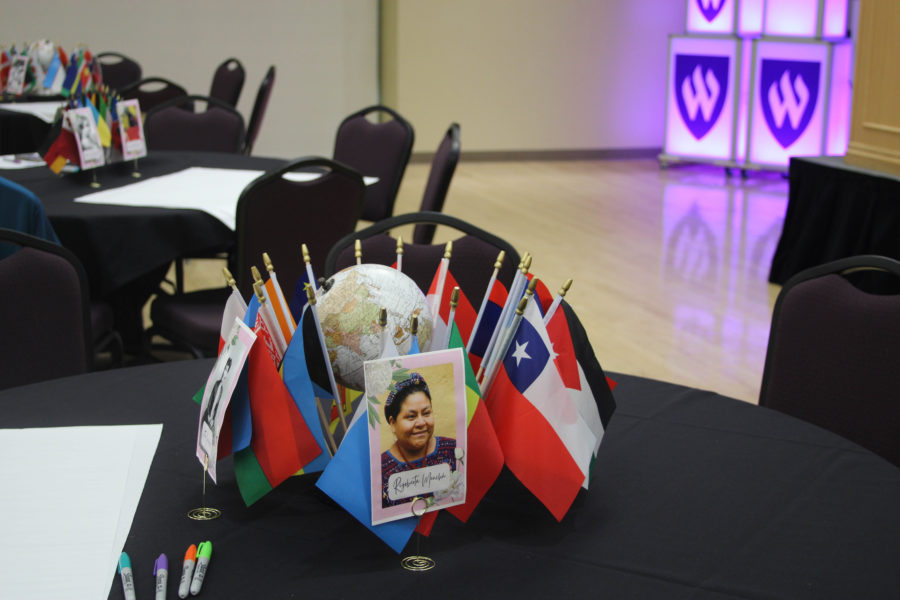Remembering influential women in history
Bertha Benz, a German inventor and wife and partner of automobile inventor Karl Benz, decided on Aug. 5, 1888, to take her two sons, Richard and Eugen, and traveled 105 km across unpaved roads without her husband knowing.
During her journey, Benz had to become creative. She needed to find ligroin, the petroleum solvent used as fuel, because her vehicle had no fuel tank and only 4.5 liters in the carburetor.
Benz also used her garter as insulation around the engine to avoid overheating and used her hatpin to remove a clog in the fuel line. When the wooden brakes failed, she visited a cobbler to add leather, making the first brake pads.
This was the first successful long-distance journey in an automobile. Benz used her dowry money to fund her and her husband’s automobile company, which became part of Mercedes-Benz.
Bertha Benz’s was one of the stories shared by the Women’s Center at a luncheon on March 15. The event was a place for women to gather and tell stories, as well as learn about other influential women.
“I’m a bit of a history nerd in that way, and so tying into that, I just love learning about women in history and their accomplishments that so often go unrecognized, and by honoring them and recognizing them today, we really can find our own power,” Annabell Durham, an employee of the Women’s Center who led the event activity, said.
At the luncheon, there were photos of women throughout history who have been somewhat forgotten. People at the event split into groups and did brief research on these women and why they should be remembered and presented what they found to the room.
Jerrie Mock
Jerrie Mock was the first woman to successfully fly around the world solo. In 1964, Mock left to follow Amelia Earhart’s flight path in a Cessna 180.
Mock gained the nickname The Flying Housewife, since every time she landed to refuel, Mock would put on a pair of heels and a pearl necklace to appeal to gender norms at the time. When she got back into her cockpit, though, it all came off.
In 1965, Mock was awarded the Louis Blériot medal for setting a new aviation record. Her plane is on display in the Smithsonian aerospace museum in Washington D.C.
“I knew one thing: I wanted to see the world,” Mock said in 1996 about her flight.
Mock passed in 2014 and was taken up in the Cessna 180 she flew around the world in after she was cremated.
Bayan Mahmoud Al-Zahran
Bayan Mahmoud Al-Zahran is the first woman in Saudi Arabia to be issued a law license. Mahmoud Al-Zahran first represented a client in front of the General Court in Jeddah in 2013, and in 2014, she opened up Saudi Arabia’s first all-woman law firm.
Mahmoud Al-Zahran was featured in Arabian business as the seventh-most powerful Arab woman in 2015.
Mahmoud Al-Zahran’s intention when she started practicing law was to bring women’s issues to court and represent them in hopes of improving women’s lives in Arabia and started by studying domestic violence.
Patsy Mink
Patsy Mink was a member of the United States House of Representatives from 1965-1977 and again from 1990 until her death in 2002. She is the first woman of color to be elected to Congress.
Mink sued the Environmental Protection Agency to get documents that had been hidden by then-President Richard Nixon regarding nuclear testing on Amchitka Island. Mink believed that under the Freedom of Information Act, the information about the testing should have been made public. The documents were labeled as sensitive documents and could not be released in their entirety.
Mink also co-authored the Title IX amendment of the Higher Education Act.
Title IX prohibited discrimination based on gender in federally-funded places of higher education such as colleges and universities. The bill was signed into law by Nixon in 1972. In 2002, Title IX was renamed to Patsy T. Mink Equal Opportunity in Education Act in her honor.
Mink also introduced the Women’s Education Equity Act, which allocated funds to promote equality in schools.
“As awesome as it is to highlight these powerful badass ladies, I think there is also a lot of power in the women we meet in our day-to-day lives,” Durham said. “Think of our moms — they might not be historic, but they have an impact on our lives. And think of honoring and respecting women and their choices regarding whether they want to follow their dreams and do these amazing life-changing things — that’s great — but if they just want to live a quiet simple life, that doesn’t make them any less important.”
Editor’s note: This story has been updated to correct the spelling of the name Annabelle Durham.














